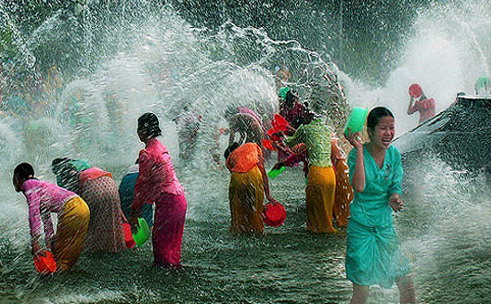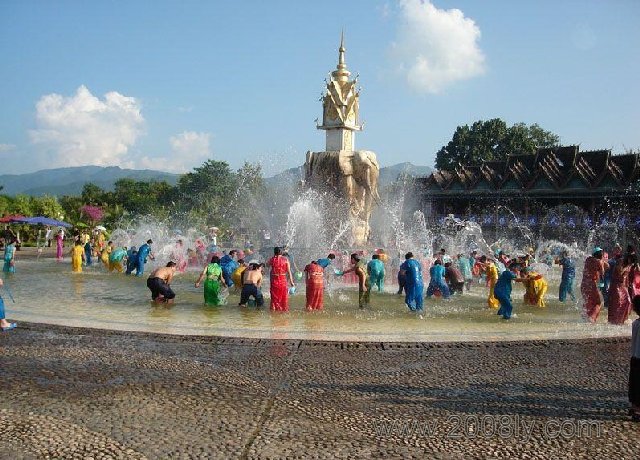Water-Splashing Festival
Updated: 2010-07-27 14:32
(chinaculture.org)
|
|||||||||||
The Water-Splashing Festival is a traditional festival for the Dai people in the Dehong area of Xishuangbanna, Yunnan Province in the southwest of China. It is the New Year for the Dai, a festival to send off the old and greet the new. It lasts three or four days.

Held during the sixth month of the Dai calendar, usually falling in mid-April of the Gregorian calendar, the Water Splashing Festival is also known as the Festival for Bathing the Buddha.
During the festival, the door of every house is decorated with multicolored pieces of paper. All the villagers dress in their holiday best. Sheep and cows are slaughtered for feasting, plus delicious glutinous rice cakes, rice noodles, and rice wine. The occasion is marked by a variety of entertainment, including singing and dancing, fireworks displays, boat racing, exhibiting Kongming (air-borne) lanterns, bathing the Buddha, and parades and fairs. But the most popular event is water-splashing.

On the eve of the first day of the festival, activities include fireworks displays and dragon boat racing. The second day is known as Neuter Day, which belongs to neither the old nor the new, year. On this day, according to custom, people usually stay at home.
The third day falls on New Year's Day. In the morning, people dress up and go to the temple to worship Buddha. They make three to five pagoda-shaped sand piles over one meter tall and plant eight bamboo twigs on the top wrapped in red and green strips. They then sit around the pagodas to listen respectfully to scripture and historical legends, and pray for good weather and many offspring. In the afternoon, every woman will carry fresh water to clean the Buddha statue so she might get his blessing. People then splash water on each other to symbolize the blessing, rinsing away sickness and disaster with holy water for a happy life.
Water splashing is central to all because water, the symbol of holiness, goodness and purity, is the most precious thing to the Dai. During the festival, men and women indulge themselves in a spree of water-splashing. They gather along roadsides and in public parks and squares armed with buckets and basins of water or carrying squirt guns, to drench each other in wishes for good luck and a happy new year.
At night, music accompanied by drumbeats reverberates throughout the villages, and people enjoy dancing and singing to their hearts' content.
The Water Splashing Festival vividly exhibits the Dai's homage to water and the culture of music and dance, food, and costumes. It is also a cultural bridge between Xishuangbanna and Southeast Asian countries that share the same festive culture of water-splashing.
Legend
Although there are numerous legends about the origin of the festival, one of the best known tells of the long ago days when there was a devil in the village where the Dai people lived, doing all manner of evil things. All the people hated him but his magic was too powerful for them to overcome.
One day in the sixth month of the year, his seventh wife, who had been kidnapped from the village, tricked him into revealing his weaknesses. As he slept, his wives used his hair to cut off his head. But the head began to burn when it touched the ground, and the fire would die only if one of the women held the head tightly in her arms.
So the seven wives took turns holding the head, each for a period of one year. Every year when they changed, people would splash water on the woman who had been holding the head for the past year to wash away the blood and a year of fatigue.
As time went by, the ritual became a happy way to send off the old year and greet the new. And splashing water on one another became a way to vanquish the devil and symbolically express the wish for good luck and a better future.